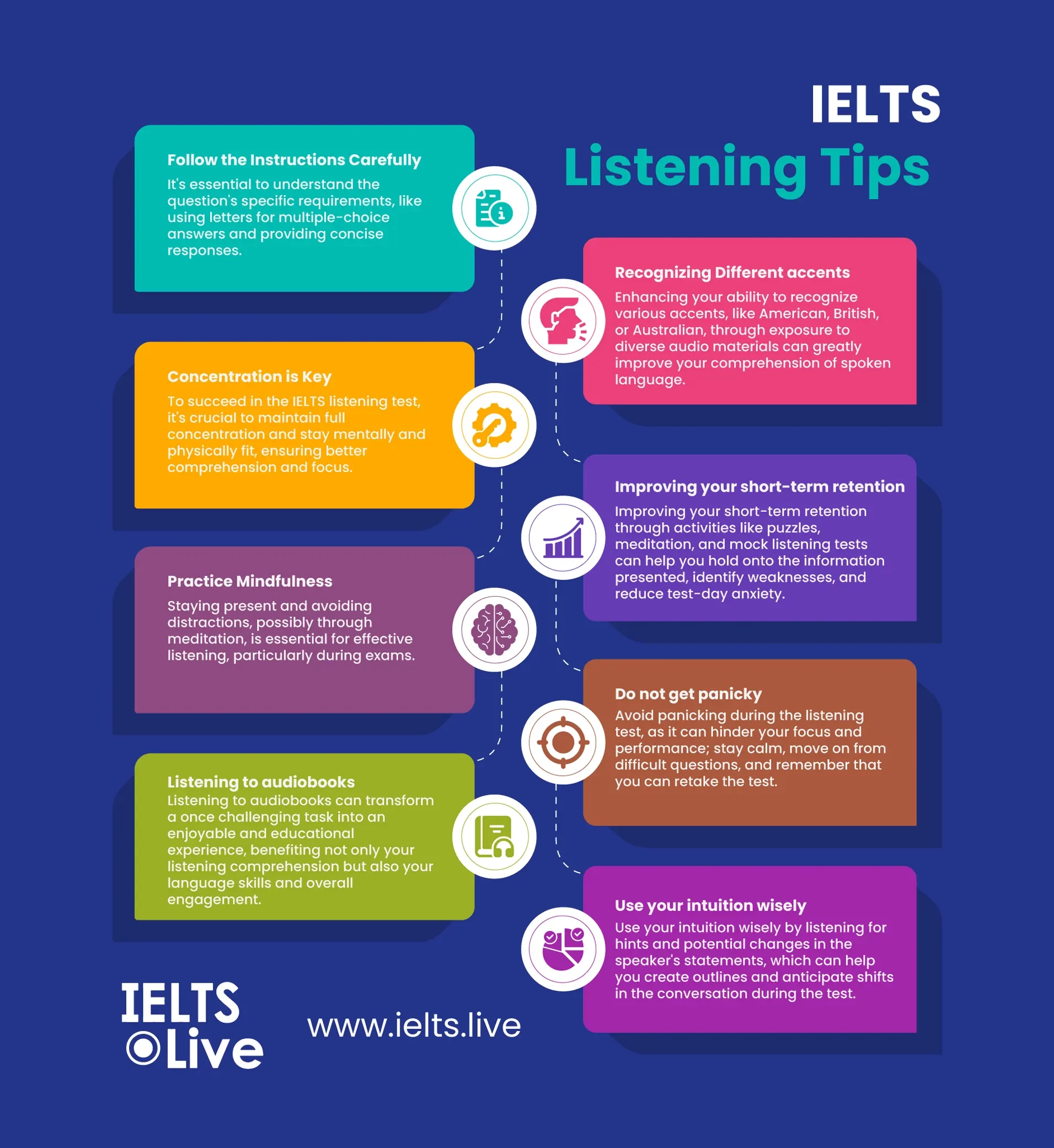
When you're new to learning about the IELTS exam, it may seem almost impossible to get a band score of 8.5 in the listening segment, especially as a non-native speaker.
However, being a non-native speaker of the English language myself, I have managed to achieve an 8.5 with only 7 days of preparation.
And in this blog post, I'll be sharing what I learned during my preparation and providing some tips and tricks about IELTS listening that may help other non-native speakers improve their English language skills and achieve a high score in the IELTS exam.
I believe the thing that makes the most difference in the IELTS listening test is your ability to pay attention. If your attention alters that may mean losing several points which will be difficult to make up for.
Now let’s dive into some tips and strategies that worked for me and helped me get a band score of 8.5.
You may also like: Critical Factors Leading to IELTS Listening Test Failure
Follow the Instructions Carefully
It is crucial that you know what sort of answer the question is asking for. For instance, A singular-word response is inappropriate if the question calls for a plural response. Answers with multiple choices will ask for a letter (a, b, c, d). Instead of the word, write the letter.
When asked to complete a sentence with no more than two words, "A door made of wood" is incorrect; the proper response is "wooden door." The same is true of numbers. If you fail to answer in the format that the instructions ask for, your answer will be considered incorrect.
Concentration is Key
The first thing to remember is that you MUST learn how to put all your concentration into the audio and the information you need to catch. You won't be able to receive the desired band on the IELTS listening test if you lose focus while listening. It might cause you to misread questions, fail to comprehend the passage, panic while trying to find the right answers, and so on.
Maintaining your mental and physical fitness allows you to remain aware, alert, and focused during your exam. Make small changes to your diet to make it healthier, exercise on a daily basis, practice listening to English regularly, give mock tests, and overcome the stress of time management.
Practice Mindfulness
It is important that you know how to be present in the moment cause if your attention falters you might not be able to focus on what is being said. Your mind might start wandering and you may end up losing yourself in your own thoughts.
Due to this, you may lose track of the audio. A great way to learn how to stay mindful is through meditation. It allows you to focus on the object and prevents mind scatteredness. This helps a lot in exam time when we solely need to focus on listening
Listening to audiobooks
Don’t take listening as a task but make it fun. A great way to do that is by listening to audiobooks. I often struggle with falling asleep and listening to audiobooks is my way of lulling myself into a deep sleep.
When I first started listening to audiobooks it was a bit difficult to focus. I had to put all my attention into listening but as I grew accustomed to it, I could listen to audiobooks while cleaning my room or while painting as well.
I find audiobooks very entertaining and a great way to develop your listening comprehension. Audiobooks will also improve your general English language skills as well. such as vocabulary.

Recognizing Different accents
If you don’t understand different accents it would be difficult for you to grasp the words they say in the audio. So make sure you listen to different audio materials with different accents such as American, British, or Aussie. Understanding accents can be difficult unless you’re used to it. When learners hear native speakers, their speech sounds different. It is different than written or textbook English. It will be simpler to understand these patterns if you can identify them.
Improving your short-term retention
By improving your short-term retention you’ll make it easier for you to hold onto the information the speaker says. You can try solving puzzles and meditating to improve your short-term memory. Practicing with mock listening tests helps as well.
Keep track of how much you can keep in your memory and improve over time. Additionally, mock listening tests can also help you identify your weaknesses and areas for improvement, allowing you to focus your study efforts more effectively.
Additionally, they can provide a sense of familiarity with the test format and reduce anxiety on test day.
Do not get panicky
Panicking will only make it worse. The listening test requires you to stay calm and collected. If you panic that will hamper your ability to focus and produce bad results. Even if your test isn’t going as well as you’d like it to be, don’t panic.
Also, remember that you can always take the test again. If you miss out on one answer, don’t linger. Move on to the next one right away and don't let it harm your composure.
Otherwise, you may miss out on the next answer as well. Instead, it is advisable to take deep breaths, remain calm, listen attentively to the audio, and give well-thought-out answers.
Use your intuition wisely
Speakers frequently leave hints or give a brief rundown of what they plan to discuss. You can use this to create an outline of your own to fill up later. But at the same time be prepared to hear a possible response that isn't the real one.
When two people are making plans, this frequently occurs. At first, they agree to meet at a particular time, but one of them later realizes they can't, so they choose a different time. Hear for words like however, but, then again, etc. since these might mean a change of opinion.
Finally, remember that the most important task is to pay attention and understand the format of the IELTS listening test, as well as the instructions given at the beginning. Concentration is key to receiving the desired band on the IELTS listening test.
Maintaining mental and physical fitness, mindfulness, listening to audiobooks, and recognizing different accents are essential for success. Listening to different accents will help you understand the words they say in the audio.
Identifying native speaker speech patterns and improving short-term retention are keys to understanding native speaker speech. Practice with mock listening tests to identify weaknesses and areas for improvement. Stay calm and listen attentively to the audio. And you'll be on your way to achieving a good score in the listening section.










0 COMMENTS